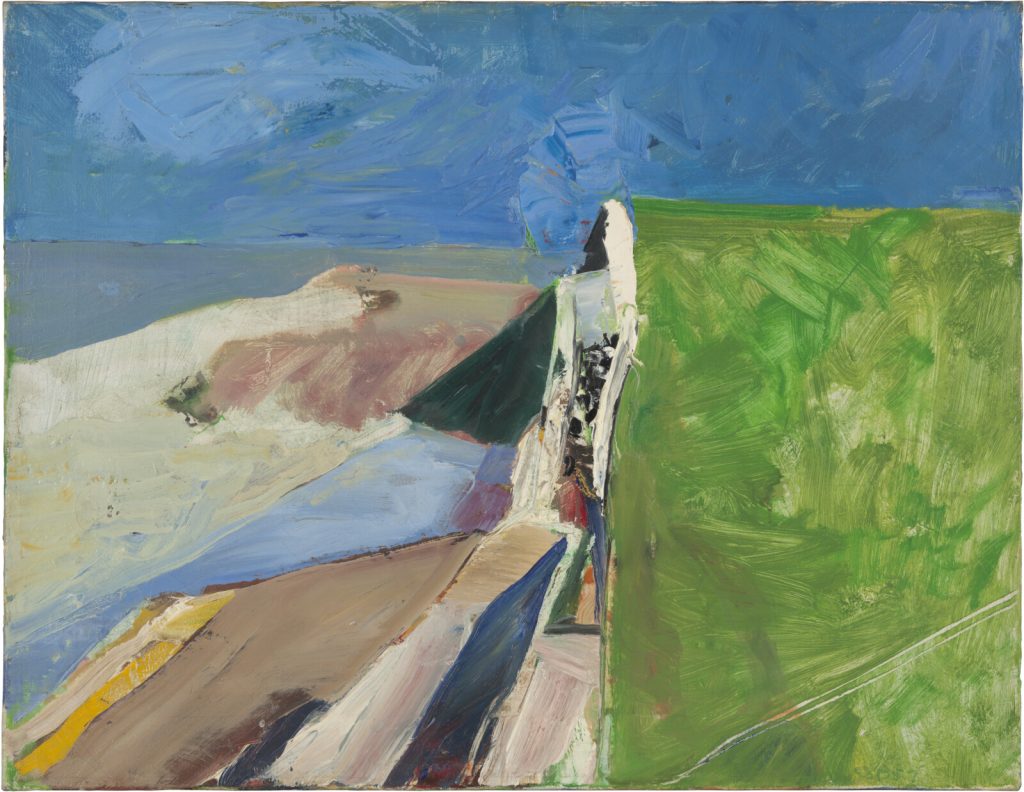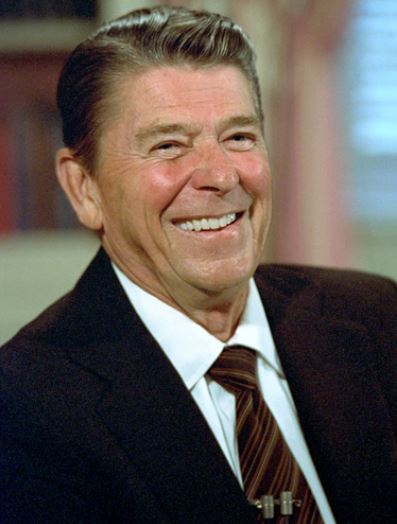Remembering the Reagan Years
by Kenneth Francis (October 2024)

With America in a state of chaos and losing its direction, the timing of a new movie on Ronald Reagan is apt in showing us what America used to look like during a mini golden era during the 1980s, despite the decade having many scandals.
The movie, Reagan, is based on Paul Kengor’s 2007 book, The Crusader: Ronald Reagan and the Fall of Communism. Writing in The Iconoclast last month, author/historian Daniel Mallock, sums up quite well the core of the film in his fine essay:
The portrayal of Reagan by Dennis Quaid in this excellent movie is a touching, deep, and impressive take on this exceptional president and his extraordinarily supportive wife, Nancy. Quaid is convincing and impressive as Reagan and, within half an hour into the film, completely becomes the president on the screen. Penelope Ann Miller is sympathetic as Nancy Reagan, too. This is an old-fashioned sort of film. While some movie tricks are used to get real 1984 Mondale on the debate stage with present-day actor playing Reagan, the movie is character—and event-driven in the main. The acting is solid and the pacing excellent.
In my opinion, politics is usually revolting and dark. Unfortunately, we are stuck with it. On a purely pragmatic level, Ronald Reagan was a relatively good president, despite his many flaws. To his shame, he sometimes paid lip service to those holding the purse strings.
In an essay in Substack, Irish writer John Waters wrote: “The values we were pummeled with all our lived have been dumped, trashed, and no longer have any value in the operation of our societies, that those societies are no longer run by the people, or on behalf of the people, but by an invisible elite which simply sends orders down to those whom we elected to represent us.”
For most rational American patriots remembering the good side to Reagan’s presidency, the man had great charisma, with his Howdy-Doody face and warm voice, looking like one’s favourite uncle. He was also funny, intelligent, and spoke in plain language with straight-forward messages. With the little independent power he had, he nonetheless was a common-sense president, with, ostensibly (I never met her but saw her), a classy First Lady wife called Nancy.
As a great communicator, Reagan said: “I wasn’t a great communicator, but I communicated great things,” gathered from “our experience, our wisdom, and our belief in principles that have guided us for two centuries.” There is no doubt that his Hollywood acting skills enhanced his speeches, but his words certainly inspired many fans of the great American icon.
 Reagan was also reported to be a man of faith (I’m sceptical about this). Quoted in The Christian Post, Paul Kengor said he was doing a book on Reagan and the end of the Cold War, so he read the speeches and the letters. He said the letters and the speeches were really illuminating. “Everywhere I looked, I came across religious references. I’m talking about not just the sign-off at the end of the speech where he says ‘God bless you and God bless America.’ I’m talking about sometimes some pretty deep theological statements.”
Reagan was also reported to be a man of faith (I’m sceptical about this). Quoted in The Christian Post, Paul Kengor said he was doing a book on Reagan and the end of the Cold War, so he read the speeches and the letters. He said the letters and the speeches were really illuminating. “Everywhere I looked, I came across religious references. I’m talking about not just the sign-off at the end of the speech where he says ‘God bless you and God bless America.’ I’m talking about sometimes some pretty deep theological statements.”
For me, the early 1980s in America was a memorable time of fun and travelling. It was the year I left the London of Thatcher’s Britain and hit the road in search of Reagan’s America. And the America I encountered was quite close to Utopia, despite its flaws.
As a European, I saw the country back then with the fresh eyes of an outsider, and there was a real buzz in the air and a strong sense of optimism. Most people were breezy and laughed a lot. It was also a time before the mainstream media became fully dedicated activist propaganda stenographers for Leftist interests with deep pockets. I write ‘fully dedicated’ because there was always a close relationship with the media and rich tycoons holding the purse strings on the State’s policies.
But political news stories aside, on British television that year, one of the most popular programmes was Entertainment USA, a series broadcast by the BBC with Jonathan King as its host. This show, which ran for eight years, was a mega hit and presented entertainment news, interviews, and music from the USA. Watching Entertainment USA was a good incentive for me to go see Reagan’s America.
After landing at O’Hare Airport, Chicago, I got a car, left the city and headed for Route 66. The first part of the journey was a 2,500-mile voyage through the American heartlands to a city where they used to wear flowers in their hair but now they defecate on the streets in a scene resembling a zombie apocalypse, thanks to the Democrats’ decades of rule and destruction.
Along the road, I briefly visited many towns and cities to get a feel of the place and people. Meanwhile, as the Golden State drew nearer, Randy Newman’s big hit “I Love L.A.,” reflecting the happy mood of the country, would occasionally blast from the car radio:
From the South Bay to the Valley
From the West Side to the East Side
Everybody’s very happy
‘Cause the sun is shining all the time
Looks like another perfect day
I love L.A.
Another hit song at the time reflected the mood of America: “Walking on Sunshine,” by Katrina and the Waves. After leaving Route 66, it was off to downtown San Francisco. I then drove to Portland in Oregon. After Portland, I drove back down the Pacific Coast, through L.A. and all the way back to Georgia on the east coast by various routes—the entire trip clocking around 10,000 miles.
The author James Nuechterlein wrote: “After weathering a severe recession, the economy, spurred by a controversial tax-cut program that Reagan steered through Congress with flair and skill, took off in 1983 on the longest peacetime expansion in American history. Leaving behind the stagflation of the 1970s, the economy grew steadily over the next seven years, while inflation, unemployment, and interest rates all declined.”
Echoing those sentiments in the New York Times in January 1990, Martin Anderson wrote that from 1982 to 1989 was the greatest, consistent burst of economic activity ever seen in the U.S. “In fact, it was the greatest economic expansion the world has ever seen—in any country, at any time,” he said.
During my little odyssey, the Americans I met were the friendliest, kindest, most-welcoming, good-humoured people on the planet. Was this a reflection of the Reagan era? Today, Americans are afraid to look at each other or offend someone. Despite this, love it or hate it, America is one of the most fascinating countries in the world and millions of people who have disdain for it, paradoxically, want to emigrate to it.
The writer Dinesh D’Souza, who was policy adviser to Ronald Reagan, told the story of a friend in India who wanted to come and live in the USA. When asked why he so desperately wanted to emigrate, the friend said he wanted to live in a country where all the poor people are fat.
Reagan loved America. In contrast, contemporary political leaders in the West have disdain for their own countries. As the late philosopher Roger Scruton observed: “Oikophobia [a rejector of one’s culture/country] is a stage through which the adolescent mind normally passes. But it is a stage in which some people—the intellectuals especially—tend to become arrested. As George Orwell pointed out, intellectuals on the Left are especially prone to it, and this has often made them willing agents of foreign powers.”
On August 17, 1992, at the Republican National Convention in Houston, supporters of President Reagan held aloft signs, some with the slogans, “Stop the Liberal Media Lynch Mob!” One wonders what those supporters who are still alive today would make of the situation in 2024.
The mainstream U.S. foreign policy establishment would have viewed Reagan as a major threat to their anti-American deeds, and the same applies today with the potential that Donald Trump will become president again this coming November.
When Trump was president, people got more bang for their Buck. Nowadays, look at some of your old purchasing receipts from when Trump was president and compare them with recent receipts from the Biden-Harris years: Real disposable income per capita, down 7.7%; Home ownership affordability, down 32.3%; Credit card debt, up 42%; Monthly savings, down 79.9%; Deisel, up 50.53%; Gas, up 40.9%; Electricity, up 29.3%; Natural gas, up 27.15%; plus lots more other costs that have risen, with wages going down (Source: Heritage.org data visualization, updated June 25, 2024. Some of these price hikes have risen further since June).
To quote Bill Clinton: “It’s the economy, stupid.” The most expensive small vehicle to operate in America now is the supermarket shopping trolly. And the current government are not helping you financially, that’s for sure. In fact, their idea of helping you is, for the struggling citizen, both negative and inverted.
Reagan once said: “The nine most terrifying words in the English language are, ‘I’m from the government, and I’m here to help.’”
Table of Contents
Kenneth Francis is a Contributing Editor at New English Review. For the past 30 years, he has worked as an editor in various publications, as well as a university lecturer in journalism. He also holds an MA in Theology and is the author of The Little Book of God, Mind, Cosmos and Truth (St Pauls Publishing) and, most recently, The Terror of Existence: From Ecclesiastes to Theatre of the Absurd (with Theodore Dalrymple) and Neither Trumpets Nor Violins (with Theodore Dalrymple and Samuel Hux).
